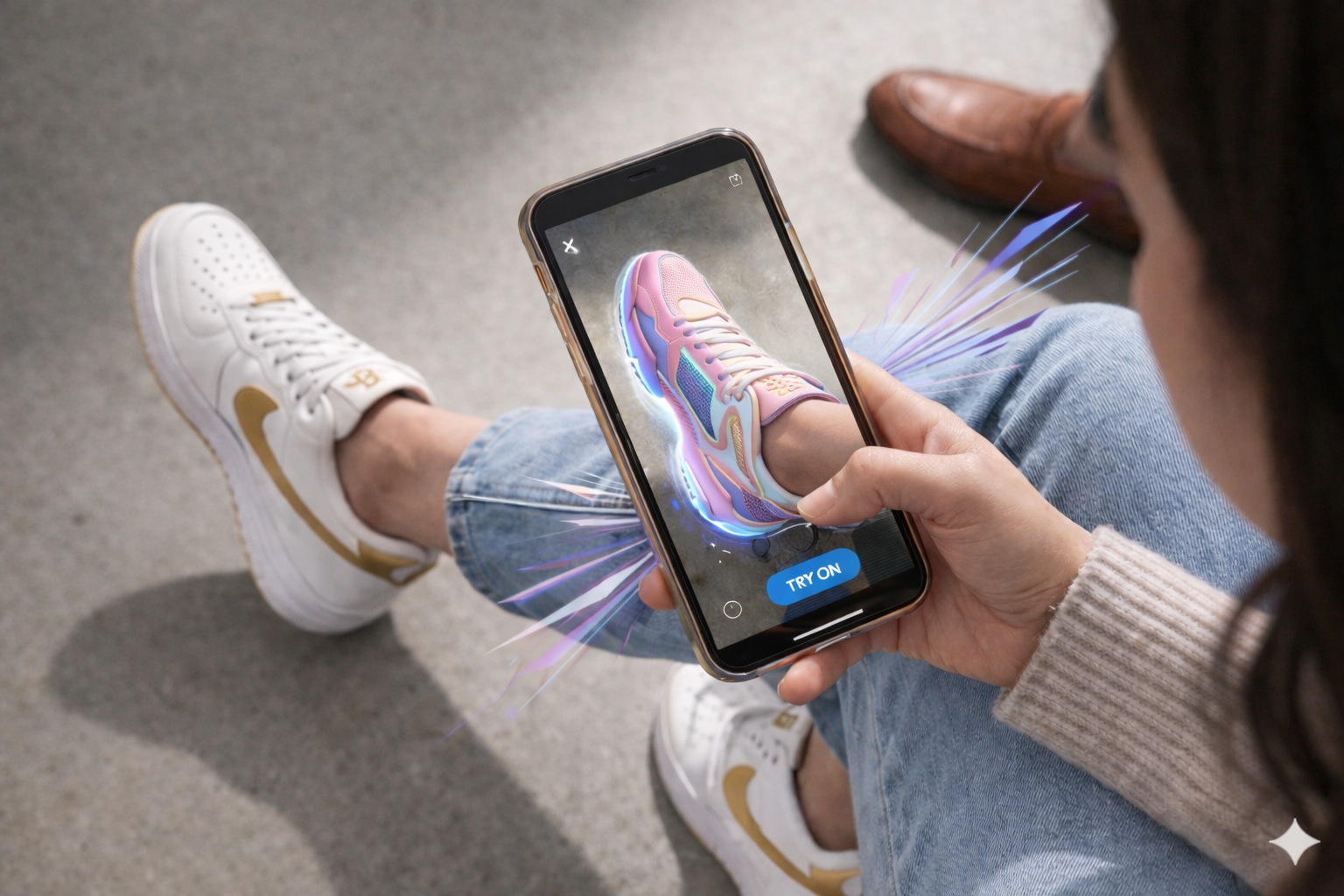The Most Innovative AR Companies to Follow in 2025

Over the past decade, we’ve experienced a significant technological shift driven by innovators blending the physical and digital worlds. Augmented reality (AR) has become a game-changer across various industries, from retail to healthcare, transforming how businesses engage with their environments and customers. This evolution is especially notable among younger generations, who are deeply immersed in AR technology.
AR’s capacity to create immersive, interactive digital experiences has dramatically reshaped customer interactions, and its impact has skyrocketed in 2024. With continued advancements, AR is poised to further revolutionize industries, enhancing both user engagement and business growth.
Key Insights
Augmented Reality (AR) Growth: The AR industry is expanding rapidly, driven by innovations from key companies like Apple, Google, and Magic Leap. AR is transforming industries from retail to healthcare, offering immersive experiences that enhance customer engagement and operational efficiency.
Market Potential: AR is projected to generate $40.4 billion in revenue by 2024, capturing 65% of the spatial computing market. This growth is fueled by both consumer-facing applications like virtual try-ons and enterprise solutions like digital twins.
Enterprise Focus: Companies like Microsoft and PTC are focusing on enterprise AR applications in sectors like healthcare and manufacturing, leveraging AR to improve productivity and streamline processes through real-time data visualization and remote assistance tools.
Retail and Marketing Revolution: Companies like artlabs and Meta are making significant strides in using AR to revolutionize online shopping and social media. artlabs, for example, offers no-code platforms that allow retailers to convert 2D images into interactive 3D models, enhancing virtual shopping experiences.
Why Augmented Reality Technology is Here to Stay
AR companies specialize in blending digital content with the world around us to enrich experiences in real time. With a wide variety of potential implementations, including virtual try-ons and immersive gaming experiences, augmented reality is reshaping how we engage online.
According to reports, AR accounts for 65% of the spatial computing market share and is expected to generate $40.4 billion in revenue in 2024, driven by innovations from major tech companies.
As businesses continue to leverage AR to change the way we see our environment and revolutionize industries, learn more about the companies leading the way in AR innovation.
Top 10 AR Companies to Watch in 2025
The following companies are set to dominate the augmented reality market in 2025. In terms of software and hardware development, these companies are pushing boundaries and setting the standard for augmented reality innovation.
1. Apple
Always at the forefront of the tech industry, Apple is rapidly evolving in the AR space with its Vision Pro headset and ARKit, a software development kit for creating AR experiences on iOS devices. Apple's RealityKit, an AR-first 3D framework, blends virtual content with real-world environments, offering immersive experiences. With features like AR Quick Look, users can now view 3D models directly in real-life settings. By acquiring companies like Metaio, Apple reinforces its position as a leader in AR, making AR applications easily accessible through iPhones and iPads.
Top AR Product: Apple Vision Pro
2. Google
Of course, Google is not used to standing on the sidelines while new technologies take over the world. The company is a significant player in AR with tools like ARCore and Google Lens. ARCore allows developers to create AR applications with features like motion tracking and environmental understanding, while Google Lens enhances visual search capabilities. Google's Maps AR Navigation redefines real-world navigation by overlaying digital directions onto physical spaces. While they shelved the promising Tango project, Google still continues to invest in AR innovation, positioning itself as a driving force in the future of augmented reality.
Top AR Product: Google Lens
3. Meta (Facebook)
Another tech giant, Meta, formerly Facebook, has also entered the field of AR. mainly through platforms like Spark AR, enabling creators to develop interactive AR effects for social media. Meta's vision for the future includes the integration of AR in its metaverse efforts, integrating physical with digital worlds. While the company's collaboration with Ray-Ban on smart glasses isn't fully AR-capable yet, Meta's ambitious project, Project Nazare, aims to deliver immersive AR experiences without dependence on smartphone screens. The company's investments in hardware like Oculus Rift continue to push AR technology forward.
Top AR Product: Ray-Ban Meta Smart Glasses
4. Microsoft
Microsoft entered the AR space with the HoloLens, a mixed-reality headset that offers advanced holographic computing and gesture recognition, primarily designed for enterprise use. By integrating with Azure Spatial Anchors, developers can create spatially-aware AR applications, enhancing real-world interactivity. Unlike many competitors targeting consumers, Microsoft focuses on sectors like healthcare, education, and manufacturing, positioning itself as a leader in business-focused AR solutions. The HoloLens 2 further improves upon its predecessor with ergonomic upgrades and advanced tracking capabilities, delivering smoother, more immersive AR experiences tailored to industrial and professional environments.
Top AR Product: HoloLens 2

5. artlabs
artlabs is a rising innovator in 3D product visualization and AR technology for eCommerce. Its no-code platform allows businesses to transform 2D product images into interactive 3D AR models, boosting customer engagement with virtual try-ons and lifelike visual assets. What sets artlabs apart is its ability to deliver fast, scalable AR solutions tailored to the needs of retail brands, especially footwear, giving them a distinct advantage in the competitive digital marketplace. By consistently advancing AR tools and technologies, we pride ourselves on being a forward-thinking company. Our commitment to research and innovation ensures it continues exploring new ways to integrate AR into everyday shopping experiences, pushing the boundaries of what's possible in immersive shopping experiences.
Top AR Solution: artlabs Studio
6. Unity
Unity Technologies is a leader in AR development, offering a robust suite of tools that empower developers to create immersive AR experiences across industries. Through Unity's AR Foundation, developers can build cross-platform AR applications for both iOS and Android, simplifying the development process. Unity's commitment to accessibility has fueled notable successes like Pokémon GO and expanded the use of AR in fields such as automotive and architecture. Additionally, Unity's MARS platform enhances AR interactions, making it one of the most versatile and powerful tools in the AR ecosystem.
Top AR Solution: AR Foundation
7. Qualcomm
Qualcomm's Snapdragon XR chip is foundational in enabling advanced AR and VR experiences. With the release of the Snapdragon XR2 Gen 2 chip, Qualcomm continues to push AR technology forward, offering faster processing speeds and enhanced AI capabilities. As a key player in the industry, Qualcomm's processors are used in numerous AR devices, including the Meta Quest 3 VR headset. Their strategic investments in 5G technology ensure that AR applications, particularly in smart glasses, benefit from low latency, delivering smoother, more immersive experiences.
Top AR Chip: Snapdragon XR2
8. Magic Leap
Magic Leap is renowned for its innovative spatial computing technology, focusing on enterprise AR solutions. Backed by over $3.5 billion in investments, Magic Leap's platform, Magicverse, blends virtual elements with the physical world, providing digital overlays for industries like healthcare, defense, and manufacturing. The upcoming Magic Leap 2 headset is set to enhance the AR experience, offering improved visual clarity and more powerful applications for enterprise use. Magic Leap stands out as one of the few companies delivering dedicated hardware specifically designed for enterprise AR solutions.
Top AR Product: Magic Leap 2
9. Treeview
Treeview is a leading global AR development studio recognized for building immersive AR/VR custom applications. Focusing on enterprise use cases and Fortune 500 level clients, Treeview delivers custom augmented reality solutions that improve workflows, training and user experience. Since 2016, Treeview has delivered high profile projects for Microsoft, Medtronic, ULTA Beauty and the Canadian Government, establishing itself as a leader in the AR, VR and XR industry.
Top AR Agency: Enterprise AR App Development Services
10. PTC
Based in Boston, MA, PTC focuses on delivering industrial AR solutions through its Vuforia AR Suite. Vuforia Studio allows businesses to visualize digital twins, IoT data, and CAD models within real-world environments, significantly enhancing operations and productivity in industries like manufacturing and retail. The suite includes Vuforia Engine, which provides advanced object recognition, and Vuforia Chalk, a tool for remote assistance, making PTC a leader in integrating AR into industrial workflows. By leveraging both AR and IoT, PTC accelerates digital transformation, streamlining processes and improving overall user experiences across various sectors.
Top AR Product: Vuforia

The Bottom Line
The augmented reality (AR) industry is rapidly expanding, with major players like Apple, Google, Magic Leap, as well as up-and-coming companies like artlabs driving AR innovation across multiple sectors.
AR companies are reshaping how industries approach immersive experiences, ranging from marketing and eCommerce to industrial applications and employee training. As AR technology becomes increasingly integrated into customer engagement strategies, operational processes, and employee training, staying up-to-date on the advancements from these key innovators can give businesses a significant competitive advantage.
For companies considering AR adoption, now is an opportune moment to explore how these technologies can transform operations, elevate customer experiences, and streamline workflows, helping businesses stay ahead in an evolving digital landscape.
FAQs
1. What industries are most impacted by AR?
AR is reshaping industries such as retail, healthcare, manufacturing, and education. In retail, AR enhances customer experiences with virtual try-ons, while in manufacturing, AR improves productivity by visualizing data and offering remote assistance tools.
2. What are some top AR companies to follow in 2025?
Leading AR companies include Apple (Vision Pro), Google (Google Lens), Meta (Ray-Ban Stories), Microsoft (HoloLens 2), and artlabs (artlabs Studio). These companies are pushing boundaries in AR development across both consumer and enterprise applications.
3. How is AR transforming eCommerce?
AR allows customers to engage with products virtually before purchasing. Companies like artlabs enable retailers to offer virtual try-ons, giving shoppers an interactive and immersive experience that can increase customer satisfaction and reduce return rates.
4. What is the future of AR in enterprise applications?
Enterprise AR is expected to grow significantly as companies like Microsoft and artlabs continue to innovate with products like the HoloLens 2 and Vuforia, respectively. These tools enable real-time data visualization, remote assistance, and enhanced productivity across industries like healthcare and manufacturing.










